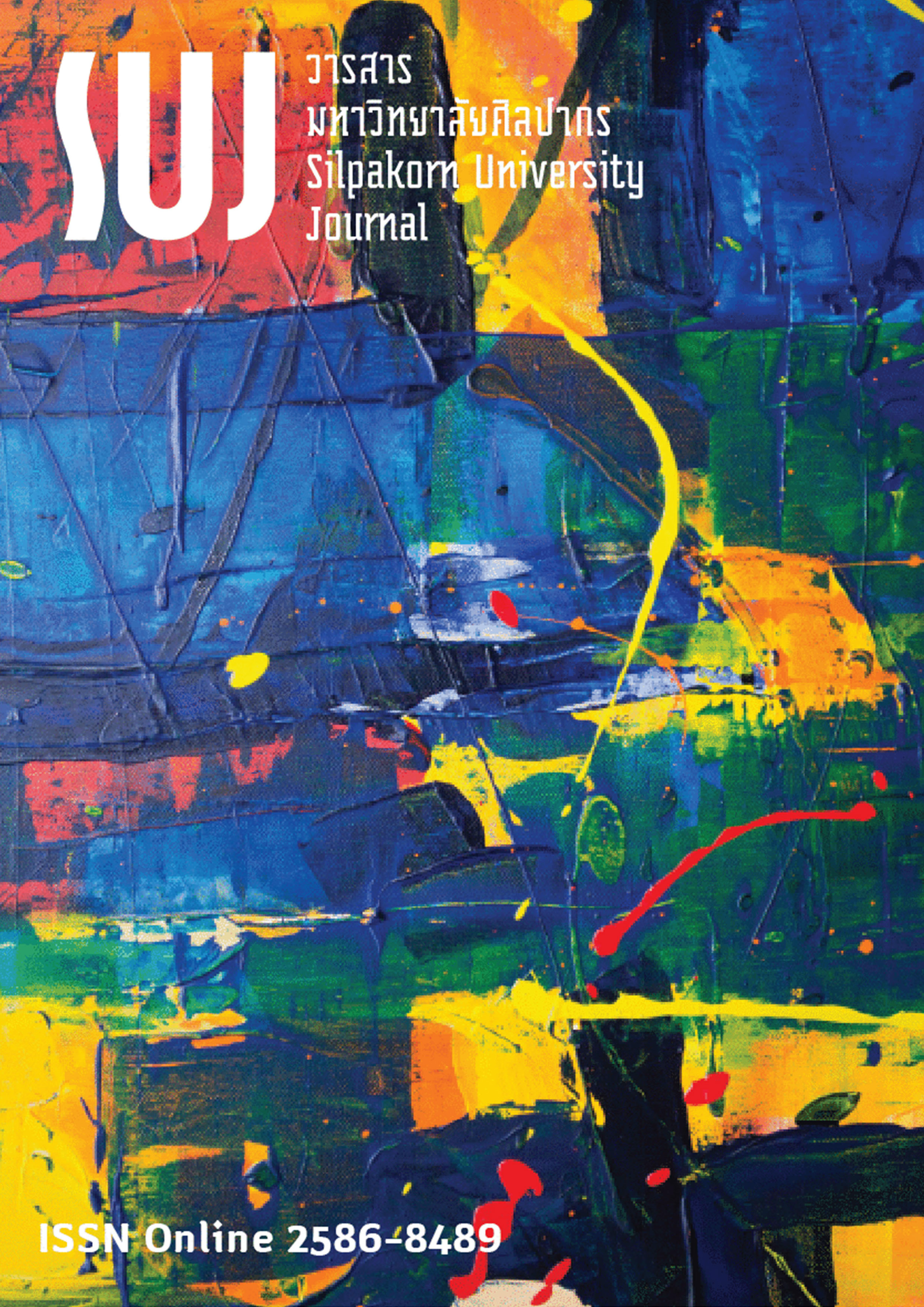วิชาชีพนักสารสนเทศไฮบริดในยุคดิจิทัล (Hybrid information professionals in a digital age)
Main Article Content
Abstract
การวิจัยนี้มีวัตถุประสงค์เพื่อศึกษาความต้องการของผู้ใช้บัณฑิตที่มีต่อการปฏิบัติงานแบบไฮบริดของบัณฑิตสาขาวิชาสารสนเทศศึกษาในยุคดิจิทัล การวิจัยครั้งนี้เป็นการวิจัยเชิงคุณภาพ ใช้วิธีการสัมภาษณ์เจาะลึก กลุ่มผู้ให้ข้อมูลสำคัญ คือ ผู้ใช้บัณฑิตที่สังกัดสถาบันบริการสารสนเทศทั้งภาครัฐและเอกชน จำนวน 17 คน เครื่องมือที่ใช้ในการวิจัย คือ แบบสัมภาษณ์แบบกึ่งโครงสร้าง และวิเคราะห์ข้อมูลการสัมภาษณ์ด้วยวิธีการวิเคราะห์เนื้อหาผลการวิจัยพบว่า ในยุคดิจิทัล มุมมองของผู้ใช้บัณฑิตที่มีต่อการปฏิบัติงานของบัณฑิตสาขาวิชาสารสนเทศศึกษา เป็นลักษณะการปฏิบัติงานแบบผสมผสานหรือไฮบริดที่บัณฑิตสามารถพัฒนาทักษะการทำงานที่หลากหลายหรือทักษะอเนกประสงค์เพื่อสร้างจุดแข็งให้กับการดำเนินงานของสถานประกอบการและการดำรงอยู่ของวิชาชีพนักสารสนเทศในยุคดิจิทัล ความต้องการของผู้ใช้บัณฑิต แบ่งออกเป็น 3 ประเภท คือ 1) ด้านความรู้ ได้แก่ การตลาด การบริการลูกค้า และการประชาสัมพันธ์ 2) ด้านทักษะ ได้แก่ ภาษาต่างประเทศ การตัดต่อคลิปวิดีโอ และการใช้ Applications/Platforms สำหรับการปฏิบัติงานในยุค COVID-19 และ 3) ด้านคุณลักษณะส่วนบุคคล ได้แก่ ความคิดสร้างสรรค์ การแก้ไขปัญหาเฉพาะหน้า และการมีจินตนาการ องค์ความรู้ที่ได้จากงานวิจัยนี้สามารถนำไปใช้เป็นแนวทางสำหรับสถาบันอุดมศึกษาในการพัฒนาหรือจัดการเรียนการสอนในหลักสูตรสารสนเทศศึกษาให้เท่าทันกับความก้าวหน้าของศาสตร์และเทคโนโลยีสารสนเทศ รวมถึงการตอบสนองความต้องการกำลังคนของสถานประกอบการในยุคดิจิทัล
The objective of this research was to study the needs of employers towards work performance of Information Studies graduates in the digital era. This research is qualitative research, the samplings were 17 employers from both public and private information service institutes. The research tool was semi-structured, in-depth interviews. The data was analyzed by content analysis method. The results found that, in the digital age, the needs of employers towards work performance of Information Studies graduates were blended or hybrid skills where graduates were able to develop multitasking or multipurpose skills to strengthen the operation of an enterprise and the existence of information professionals. The needs of employers were divided into three categories: 1) knowledge in such areas as marketing, customer service, and public relations; 2) skills such as foreign languages, video clip editing, and use of applications/platforms in the COVID-19 era; and 3) personal attributes including creative creativity, workarounds, and imagination. The knowledge gained from this research can be used as a guideline for higher education institutions to develop or manage their teaching and learning approach that keeps up with the advancement of science and information technology as well as to meet the needs of manpower in a workplace in the digital era.
Downloads
Article Details

This work is licensed under a Creative Commons Attribution-NonCommercial-NoDerivatives 4.0 International License.
References
Adolphus, M. (2021). The Hybrid Librarian. Emerald Publishing. [Online]. Retrieved November 9, 2021 from https://www.emeraldgrouppublishing.com/archived/librarians/management/viewpoints/hybrid.htm
College of Management, Mahidol University. (2020). Expertise is Not Enough When Future Job Becomes “Hybrid Job” (เชี่ยวชาญอย่างเดียวไม่พอเมื่องานในอนาคตเป็น “Hybrid Job”). Neo Academy. [Online]. Retrieved November 5, 2021 from http://neobycmmu.com/post/futurework
Corrall, S. (2008). The emergence of hybrid professionals: New skills, roles and career options for the information professional. [Online]. Retrieved November 5, 2021 from https://www.researchgate.net/publication/282261305_The_emergence_of_hybrid_professionals_New_skills_roles_and_career_options_for_the_information_professional
Dangkong, Weeranun, & Praditteera, Malivan. (2009). Applying service marketing mix strategy to promote the use of Rajabhat University libraries (การใช้กลยุทธ์ส่วนประสมการตลาดบริการเพื่อส่งเสริมการเข้าใช้บริการห้องสมุดมหาวิทยาลัยราชภัฏ). Library & Information Science, 27(1-3): 60-69.
Doyle, A. (2019). Hybrid Job and the Hybrid Skills Candidates Need Most. [Online]. Retrieved November 10, 2021 from http://thebalancecareers.com/hybrid-jobs-and-the-hybrid-skills-candidates-need-most-4586497
Ebubechukwu, E. U. (2022). The role of library and information professionals in creating a smart learning environment using modern technologies and innovations in the COVID-19 era: Introducing individuals’ uniqueness consideration. Library Philosophy and Practice (e-Journal), 6725.
Gunta-in, Sodsri, & Santi, Renuka. (2019). Knowledge Management Through Learning and Sharing Organization of Chiang Mai University Library (การจัดการความรู้สู่องค์กรแห่งการเรียนรู้และการแบ่งปัน สำนักหอสมุด มหาวิทยาลัยเชียงใหม่). [Online]. Retrieved September 20, 2022 from http://pulinet2019.buu.ac.th/Documentation/Proceeding/Poster/KM/13.pdf
Hashim, L. B., & Mokhtar, W. N. H. W. (2012). Preparing new era librarians and information professionals: Trends and issues. International Journal of Humanities and Social Science, 2(7): 151-156.
Kaur, R., & Sharma, A. K. (2018). 21st century library professionals in dynamic role in digital era. Library Progress (International), 38(1): 129-139.
Limwichitr, Saowapha. (2008). Knowledge Management in State Academic Libraries (การจัดการความรู้ในห้องสมุดสถาบันอุดมศึกษาของรัฐ). Master’s dissertation, Chulalongkorn University, Bangkok, Thailand.
Maneechat, Vichayanon, Chankaew, Wilai, Purimpaiboon, Premyupol, Yayot, Phakamon, Poonpaween, Nichapa, Jaikaew, Suda, Sukpinyo, Piyachat, & Tanchankul, Wanpen. (2022). Development of Service of the Library and Learning Center, University of Phayao Under the Epidemic Situation of the Coronavirus Disease 2019 (COVID-19) (การพัฒนากระบวนการให้บริการของศูนย์บรรณสารและการเรียนรู้ มหาวิทยาลัยพะเยา ภายใต้สถานการณ์การแพร่ระบาดของโรคติดเชื้อไวรัสโคโรนา 2019 (COVID-19)). [Online]. Retrieved September 20, 2022 from http://pulinet2022.pulinet.org/submission/uploads_file_completely/2021-12-27/pulinet559-IM.pdf
Mettarikanon, Dichitchai, & Juychum, Detdanai. (2016). Essential competencies for LIS students: Fostering the 21st century librarian (สมรรถนะที่จำเป็นสำหรับนักศึกษาบรรณารักษศาสตร์และสารสนเทศศาสตร์: การสร้างความพร้อมเพื่อการเป็นบรรณารักษ์ในศตวรรษที่ 21). Journal of Library and Information Srinakharinwirot University, 9(2): 87-97.
Pantrakool, Saisuda, Tumnanchit, Boonyalak, & Pijitkamnerd, Bunpod. (2019). The evaluation of the library and information sciences curriculum for the essential skills development of the librarians in the 21st century (การประเมินหลักสูตรบรรณารักษศาสตร์ และสารสนเทศศาสตร์เพื่อพัฒนาทักษะที่จำเป็นสำหรับบรรณารักษ์ในศตวรรษที่ 21). Panyapiwat Journal, 11(1): 221-233.
Phokheaw, Sirigarn, Phokheaw, Natr, & Noomee, Apinya. (2017). Desirable characteristics of undergraduates program in information management as perceived by information service centers in Bangkok Metropolitan area (คุณลักษณะที่พึงประสงค์ของบัณฑิตสาขาวิชาการจัดการสารสนเทศตามความคิดเห็นของสถาบันบริการสารสนเทศในเขตกรุงเทพมหานคร). Journal of Information, 16(1): 199-214.
Saenwa, Sumattra. (2012). Roles and Competencies of Librarians in Academic Libraries (บทบาทและความรู้ความสามารถของบรรณารักษ์ห้องสมุดสถาบันอุดมศึกษา). Bangkok: Faculty of Humanities, Srinakharinwirot University.
Siddiqua, N., Ansari, H., & Ansari, M. N. (2021). Changing role of librarian in knowledge management: A survey of public sector universities. Library Philosophy and Practice (e-journal), 5934.
Soutter, J. L. (2013). Academic librarian competency as defined in the library and information science journal literature of 2001-2005 and 2011. Partnership, 8(1): 1-19.
Tank, S. D., Maradiya, M. D., & Bhatt, R. V. (2017). Blended librarianship for academic libraries in digital era theory and practice: A case of ATMIYA group of institutions. In S. Parmar (Ed.), 2nd National Conference on Transforming Libraries into Digital Era: A Journey from Librarian to Cybrarian, (pp. 12-21). Beed, Maharashtra: Harshwardhan Publications Pvt. Ltd.
Tongdainoo, Tagonrat, & Boontamchauy, Sorphiyah. (2018). The desirable characteristics of the John F. Kennedy library staff in the perspective of students (คุณลักษณะที่พึงประสงค์ของผู้ให้บริการหอสมุดจอห์น เอฟ เคนเนดี้ ในทัศนะของนักศึกษา). Pulinet Journal, 5(1): 151-163.
Wamundila, S., Mulauzi, F., & Mtanga, N. (2012). Information professionals as “Hybrid Managers” in the knowledge economy: A review from the Zambian perspectives. Zambia Library Association Journal, 27(1&2): 77-84.
Yadav, A. K. S. (2021). The essential skills and competencies of LIS professionals in the digital age: Alumni perspectives survey. Global Knowledge, Memory and Communication, 71(8/9): 837-856. [Online]. Retrieved September 20, 2022 from https://www.emerald.com/insight/content/doi/10.1108/GKMC-03-2021-0049/full/html


